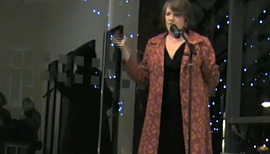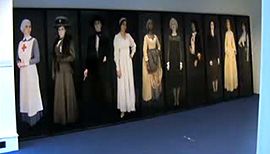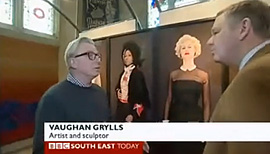
About the Work
Simone Weil was born in France. First a Marxist, and Jewish by birth, she was to become a Christian mystic and, philosopher. When the Nazis invaded France she came to London to join the Resistance. The leader of the Free French, Charles de Gaulle, thought her mad when she proposed that teams of nurses should go into battle alongside Allied troops to aid the wounded where they fell. She said that this would remind the soldiers of 'the hearths they were defending.' In sum, women and men should do the job together. But it was her political philosophy which really enraged de Gaulle. She said that France's post-Revolutionary tradition of defending human rights had encouraged selfishness and that this ideology if unchecked, would spread to other countries after the War. She said that human obligations rather than rights should be promoted instead. Luckily for de Gaulle she was in poor health, having contracted TB. Disappointed that her ideas were rejected, she refused to eat any more food than she thought was available to the occupied French. She died in 1943, having starved herself to death in the view of her doctor. Anorexia Nervosa was defined as a medical term the following year.
Here is Simone Weil just before her meeting with the Free French
Mother
The women I portrayed in this work were role models for my mother, Muriel. Together they make up her personality and like her they had charisma and chutzpah.
Muriel, a war-widow's daughter, left school at 12 to bring some money into her poverty-stricken family. Hardly able to read and write, she sold programmes and did odd jobs at the Theatre Royal, Nottingham. When she was 14 she was talent-spotted. Beginning as a hoofer in a chorus line, she became a lead dancer and singer with the stage-name Muriel Melford in a long-forgotten musical at the Prince of Wales called Bonjour Paris.
When she was in that show she met her future husband, my father. He was an Oxford-educated schoolmaster over twice her age. He introduced her to a middle-class world of unfamiliar concepts such as politics, ethics and causes. Muriel took notice. Married and back in the Midlands she spoke up about what were embarrassing issues in the provincial England of the 1940s and 50s - pacifism, the abolition of the death penalty and the sexual liberation of women.
Size and Material
6ft x 2ft / 183cm x 61cm
Digital Photograph
Location
Tags
Video
″I still use the same approach to my work: I get an idea, think of the title and then make the work. So not much has changed since 1964″
Copyright ©2024 belongs to Vaughan Grylls
Design: www.renebach.dk




